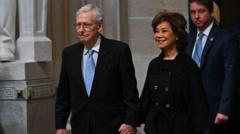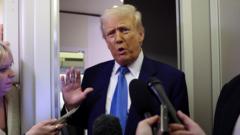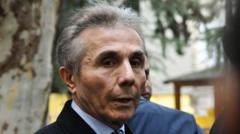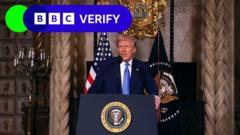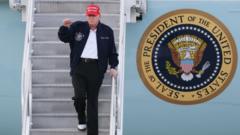Amidst significant diplomatic developments, Russia expressed firm opposition to the integration of NATO peacekeeping troops in Ukraine while engaging in discussions with US officials on resolving the ongoing war.
Russia Rejects NATO Troop Involvement in Ukraine Peace Deal, Says Lavrov
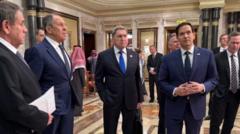
Russia Rejects NATO Troop Involvement in Ukraine Peace Deal, Says Lavrov
Russian Foreign Minister states NATO troops are "completely unacceptable" in the wake of US-Russia talks aimed at negotiating an end to the conflict.
In a recent press briefing, Russian Foreign Minister Sergei Lavrov firmly stated that Russia would not tolerate any NATO peacekeeping forces in Ukraine as a part of a potential peace agreement. This declaration follows high-level meetings that took place in Saudi Arabia where both nations began outlining a path towards negotiations. Lavrov's condemnation of NATO involvement came at a time when US Secretary of State Marco Rubio highlighted the discussions as the beginning of a long and crucial process aimed at ending hostilities.
The dialogue, significant as it marked the first face-to-face meeting between US and Russian delegations since the onset of Russia's full-scale invasion of Ukraine, raised concerns due to Ukraine’s absence from these crucial talks. President Volodymyr Zelensky of Ukraine voiced his surprise at not being invited to the discussions, emphasizing that any decisions regarding the war's conclusion should entail Ukraine's input.
In the aftermath of the Riyadh meeting, Lavrov reiterated Russia’s long-held stance that the expansion of NATO, especially the inclusion of Ukraine, represented a direct threat to Russian security interests. Rubio echoed the sentiment of a willingness from the Russian side to engage in genuine negotiations, albeit with a reminder that concessions would be necessary from both nations to facilitate progress.
The meeting also prompted expressions of concern from European leaders, as they briefly convened in Paris to deliberate over their response to the evolving dynamics between Russia and the US. UK Prime Minister Sir Keir Starmer stressed the necessity of American backing to deter further Russian aggression, while German Chancellor Olaf Scholz deemed discussions of troop deployment to Ukraine as "completely premature."
Despite the diplomatic optimism showcased in Riyadh, the uncertainty of Ukraine's fate further deepens with President Zelensky's remarks, highlighting the vital nature of Ukraine's inclusion in any potential negotiations. As discussions continue, the geopolitical landscape remains charged, with implications reaching far beyond the immediate conflict.
The recent interactions signal a potential pivot in diplomatic relations, although Russia's hardline stance against NATO involvement remains a critical barrier to a conclusive resolution in the ongoing war. The situation in Ukraine remains precarious, reliant heavily on the international community’s decisions and support.
The dialogue, significant as it marked the first face-to-face meeting between US and Russian delegations since the onset of Russia's full-scale invasion of Ukraine, raised concerns due to Ukraine’s absence from these crucial talks. President Volodymyr Zelensky of Ukraine voiced his surprise at not being invited to the discussions, emphasizing that any decisions regarding the war's conclusion should entail Ukraine's input.
In the aftermath of the Riyadh meeting, Lavrov reiterated Russia’s long-held stance that the expansion of NATO, especially the inclusion of Ukraine, represented a direct threat to Russian security interests. Rubio echoed the sentiment of a willingness from the Russian side to engage in genuine negotiations, albeit with a reminder that concessions would be necessary from both nations to facilitate progress.
The meeting also prompted expressions of concern from European leaders, as they briefly convened in Paris to deliberate over their response to the evolving dynamics between Russia and the US. UK Prime Minister Sir Keir Starmer stressed the necessity of American backing to deter further Russian aggression, while German Chancellor Olaf Scholz deemed discussions of troop deployment to Ukraine as "completely premature."
Despite the diplomatic optimism showcased in Riyadh, the uncertainty of Ukraine's fate further deepens with President Zelensky's remarks, highlighting the vital nature of Ukraine's inclusion in any potential negotiations. As discussions continue, the geopolitical landscape remains charged, with implications reaching far beyond the immediate conflict.
The recent interactions signal a potential pivot in diplomatic relations, although Russia's hardline stance against NATO involvement remains a critical barrier to a conclusive resolution in the ongoing war. The situation in Ukraine remains precarious, reliant heavily on the international community’s decisions and support.



